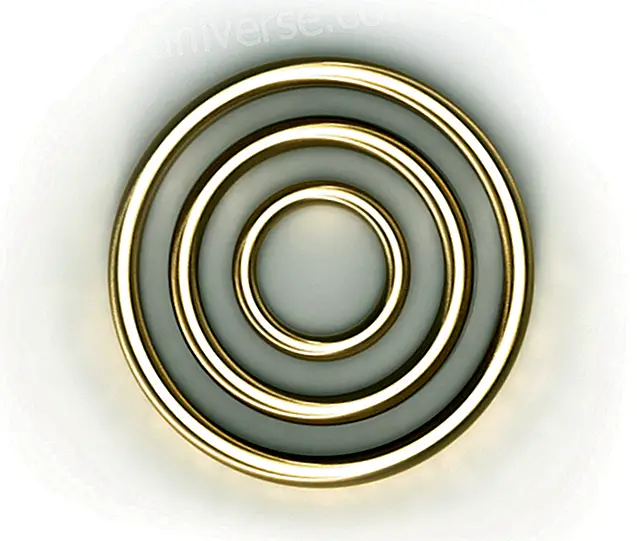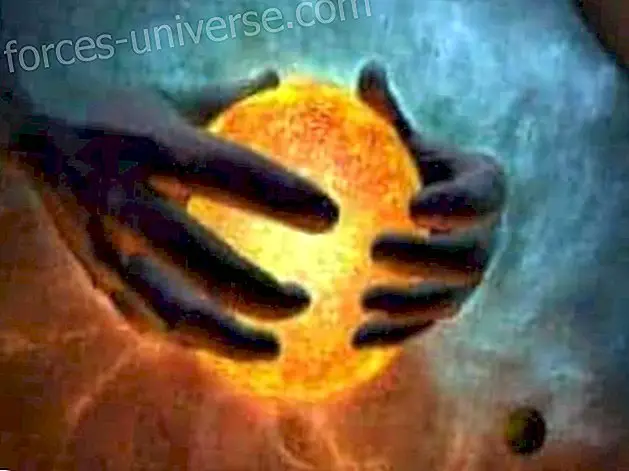In humans, they inhabit and “shoot” a cluster of feelings and emotions throughout their existence, by virtue of their biological, social and linguistic structure. Despite the existential void, it is a basic condition of human psyche.
In turn, such existential emptiness can be configured as an internal stimulus, from which other emotions and attitudes that predispose behaviors derive.
In this sense, the existential emptiness can be co-related to other feelings, such as guilt, fear and rejection.
Table of Contents
|
What is the existential void?

Taking it as an emotional sphere of human life, it would be that unpleasant feeling of drowning and constant restriction, which occurs when the person loses his sense of self, to his own life.
According to Anaya (2010) existential anguish:
It is inherent in man, as it is the result and the crystallization of the contradictions that the human condition entails. It leads to compromise, the inevitability of freedom and reflective action. (p. 19)
It should be noted that there are several theoretical frameworks to define the existential vacuum . Among them are: the philosophical, psychological, psychiatric and psychoanalytic perspective .

Philosophical Perspective

From the philosophical approach, the existential emptiness, is a perception and manifestation of nothingness, that is, of the Non-Being in homosapiens, and of the possibility of being overwhelmed by the various adverse circumstances of existence and in that, the possibility of losing himself.
In this sense, the Non-Being, is a metaphysical and natural question of the privileged entity that asks for the Self.
Therefore, the metaphysical problem overwhelms man, who does not know where he comes from, where he is going, what his desire is and what he does with his life.
Also the philosophical position of nihilism, can generate that the subject is perceived tragically, since when thinking that nothing that exists makes sense, that all the values and concepts contributed by the culture collapse, that life is totally contingent and it reveals as an unjustified gratuity where there are no supreme truths; it gives a feeling of vertigo and an ontological feeling known as the existential emptiness and anguish (also suitable for psychoanalysis)
In this sense, the non-being opens the possibility of choosing, it makes man no longer an accomplished reality but a possible reality that must be free and be responsible for all his future.
Consequently, the existential void is a condition of all of us in the world .

Psychological Perspective

In a psychological sense, the existential emptiness occurs before fear or the possibility of being abandoned, as well as a fear towards the future.
This, because the person lacks goals and objectives about his own life. Fear can create cognitive distortions about the perception of oneself and the world.
It should be noted that people with existential emptiness tend to take refuge in fantasies about their past, because they find it difficult to face the present, since it gives them the feeling of anguish.
On the other hand, experienced existential gaps are projected abroad on any entity.
For example, you can put emotions in the couple, in order to "abandon yourself" and that the other takes care of itself, so the ego expects the other person to return feelings pre-fixed by their own shortcomings and thus feeling "full" or loved, to deal with its initial emptiness.
In this way, the feeling of abandonment is the part of my being that feels empty, alone and all I want is to be filled with "something . "
Hence, people with existential gaps may have states of melancholy, associated with the dependence of another person or objects and even addictive substances.
It is common for some people to face extreme situations, expressed as a defense mechanism to deal with this feeling, regression or even depersonalization.
Therefore, it could be interpreted that in some cases of chronic depression, the individual may have some brief psychosis symptoms.

Psychoanalytic Perspective

On the other hand, in psychiatry and psychoanalysis the concept treated is linked to the idea of anguish .
Being the state of hopelessness caused when the libido has been repressed. This seeks to be satisfied, but being repressed is discharged as a state of distress.
It can also happen when the subject feels that he lost something (be it a loved one, an object or an ideal).
However, it would be necessary to differentiate said ontological feeling in the face of grief, since what is lost is unconscious and the person does not know its content; but nevertheless his “ego” has been linked energetically with the lost, accentuating the anguish and the feeling of emptiness expressed by the low self-assessment or impoverishment of the self at the mercy of the absence or shadow of the lost, which clings to the awareness.
That is why Freud (2005-1915) recalls that:
“The shadow of the object thus fell on the self, which from this moment could be considered as a special instance, as an object and, in reality, as the abandoned object. In this way, the loss of the object was transformed into a loss of the self, and the conflict between the self and the loved one, into a discord between the criticism of the self and the self modified by identification. (p.2095)
In this way, the state of anguish could be associated with a regression to the function of the oral stage, where the psyche seeks to appropriate the object by integrating it or "devouring it within itself" (avoiding loss) .
Here it may be associated with the effluvium of ambivalent feelings between love and hatred of reality or lost idea, so that repressed anger would emerge as a form of aggression (but not on the object or reality, since it is unacceptable consciously) back towards its I myself, in order to be bound by the conflict of discomfort, lack and emptiness.

What dynamics and symptoms can occur in a severe crisis of existential emptiness?

The existential emptiness together with the perception of lack or loss that occurs in the subject, immerses it in an abyss (which is sometimes unconscious) where various symptoms occur - depending on the singularity of the subject - articulated by behavioral dynamics under the tutelage of mechanisms of defense, as for example: the rationalization of nihilistic philosophers about their own feelings, their exercise of sexual function or their relationship with their peers, which leads them to an inhibition of their desire towards the world.
At another time, the displacement of an unacceptable sensation - lantern - towards the outside world, which makes him feel contemptuous (it would be necessary to review how the quality of this person's paternal relationship is, given that the outside world is a signifier of the father) .
Or the retroflexion of aggressive impulses towards a person or circumstances, returned to their own self (generating states of melancholy ) accompanied by feelings of inferiority, ideas of self-reproach.
Or the projection of one's own deficiencies on objects that are supposed by the I as "satisfaction givers" such as food, drink or other drugs (hence there is a tendency towards addiction ).
In addition, the existential vacuum can be projected as the longing for connection with others and lead to a non-operational dependence, since these connections would be based on the fantasy of merging fully with the other and with the desire of the other, and ultimately submit and lose one's desire and freedom .
Also, a loss of interest in the external reality can be generated, by the capacity to love, reluctance or apathy for productivity and a devalued perception of oneself (which may be associated with the feeling of guilt) consequently the feeling of worthlessness may appear, where we are unable to contribute something to others and ourselves.
Also ideas of not being more can arise, that is to say: of suicide. Also, the existential void may be an indication (in some cases) of major depressive disorder .
As well as the inability or difficulty of enjoying activities and things that would normally be pleasant.
Finally, anxiety may occur, this is the set of feelings of drowning, narrowness, helplessness or inability to face situations perceived as threatening, accompanied by physical tensions such as tachycardia, sweating, choking, derealization or tremor .

What can you do if you feel an existential void?

Check your nuclear beliefs about yourself and the world, ask yourself, what do I expect from myself? ; What is my faith for myself? Where do I deposit my love ?; What are my short, medium and long term goals and objectives?
On the other hand, something positive about the existential emptiness is that it allows the possibility of re-meaninging you differently from how you have been doing it and in that, allowing you to “hit bottom”, that is, look at the most intimate constitution of your being.
On the other hand, meditation is a practical and effective way to find new senses about yourself, manage your emotional intelligence to seek to transcend old scaffolds and extend your horizons as an ejected entity in the world.
There are many types of meditation, look for the one that makes you feel more comfortable.
Last but not least, seek psychological support with a good therapist, either of any current with which you feel comfortable (psychoanalysis, gestalt, cognitive-behavioral, deep psychology, emotional integration) or even with a sage who dominates Other alternative techniques.

Author: Kevin Samir Parra Rueda, Editor in the Great Family of hermandadblanca.org
Bibliographic references:
- Anaya, N. (2010). Dictionary of psychology . (2nd ed.). Bogotá, Colombia: Ecoe Editions.
- Florián, V. (2002). Dictionary of philosophy. Bogotá, Colombia: Pan American Editorial.
- Freud, S. (2005). Complete Works Volume II. XCII Duel and melancholy . (1915). Buenos Aires, Argentina: The editorial athenaeum.
More information in:
- Free association (Producer). (2017, June, 02). Duel and melancholy - Freud. [YouTube program]
Available: https://www.youtube.com/watch?v=w9lJ7UQVEOA&t=3s [Accessed: 2019, June 10].
You can watch the video here






